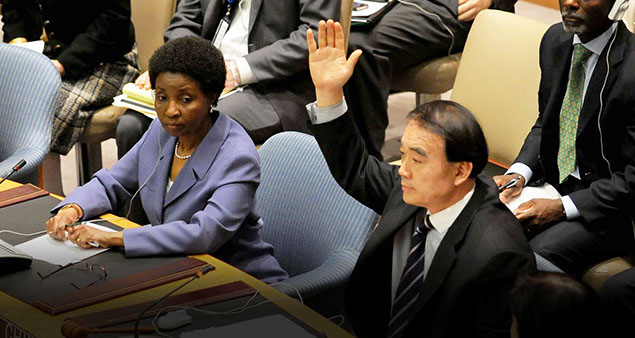
Instead of blocking the action with a negative vote, Chinese United Nations Ambassador Li Baodong (the right raising hand) voted to abstain from the resolution to authorise a no-fly zone over Libya in the United Nations Security Council in 2011.

China’s Puzzling
Diplomacy
China’s behaviour on the United Nations Security Council has sent confusing, even infuriating signals, in particular on Libya and Syria. But political scientist Dr Courtney Fung argues there is logic in China’s diplomatic moves.
China, it has been said, suffers from diplomatic schizophrenia. As a permanent member of the United Nations Security Council (UNSC), it approved sanctions and a no-fly zone over Libya and an international court referral for Muammar Gaddafi. Yet it has consistently vetoed weaker resolutions against Syria, despite evidence of much human suffering. What is going on?
One popular explanation is that China’s actions are motivated by economic interest. It had more investments and people in Libya, therefore it decided to act there.
But to Dr Courtney Fung of the Department of Politics and Public Administration, that explanation is too simplistic. She has been studying China’s response to humanitarian interventions over the past 40 years and sees a far more complex picture than the self-serving motivations ascribed by others.
“Some say it’s a strict economic, rational calculation of how to get the biggest payoff,” she said, “but I don’t find that very persuasive. I think there is also an issue of identity that the Chinese are grappling with.
“As they assume great power status, they have had to accept, over time, that there are these greater responsibilities for securing international peace and security.
“At the same time, they also think of themselves as a developing state. A lot of developing countries are very reluctant to have any type of intervention since that is all about violating sovereignty, and sovereignty is their last defence. So the Chinese have this internal dual identity struggle.”

![]() A lot of people write the Chinese off and I can understand that frustration when there are millions of displaced persons and refugees. But the questions the Chinese are asking to me are fair and rational.
A lot of people write the Chinese off and I can understand that frustration when there are millions of displaced persons and refugees. But the questions the Chinese are asking to me are fair and rational. ![]()
Dr Courtney Fung
Libya vs Syria
That struggle has played out in China’s differing responses to Libya and Syria. Actions against Libya had regional support from the League of Arab States, the African Union and the like – organisations that China saw as representing fellow developing countries. This, together with China’s assets and workers in Libya, probably influenced its support of sanctions, she said.
In the case of Syria, regional players did not coordinate their position until late in the day. More importantly, China had learned from the Libya experience that sanctions could lead to regime
change – something China does not support.
“There is a sense of learning – we got duped once, we won’t be duped again. China is also drawing a line in the sand and telling the United States, Britain and France [also permanent members of the UNSC, with China and Russia] that you can’t run wild reforming the world.”
On the latter point, China may also be motivated by its own fears about a Colour Revolution or Umbrella Movement on the Mainland, Dr Fung said. Nonetheless, the country raises important questions about the effectiveness of sanctions.
“China doesn’t see how this one-sided criticism or use of sanctions will fix a broken state. Look at the record – Egypt, Libya, Iraq, Afghanistan, these are not positive stories. China is saying, if you are going to impose sanctions or go in, what is your strategy? Are you really in it for the long run? Brazil, India, Germany and South Africa have all raised the same concerns.
“A lot of people write the Chinese off and I can understand that frustration when there are millions of displaced persons and refugees. But the questions the Chinese are asking to me are fair and rational, and in that sense they are being very responsible. Unfortunately it comes at the cost of spinning wheels because veto votes take the United Nations out of having an effective response in Syria.”
China has come a long way
Still, the situation serves as a positive sign that China is stepping up to the plate on the global stage. In the 1970s, China’s United Nations representative was nicknamed ‘Ambassador Look-out-the-Window’ because of the country’s near total lack of engagement. In the 1980s and 1990s it began to cast votes, even if they were mostly abstentions, and to explain itself. This was followed by some guarded ‘yes’ votes and, in the last 10 years, a less reactive stance.
“My two biggest bugbears are this criticism that there’s something exotic or difficult about what the Chinese are doing, and that this knee-jerk reaction is all to do with money. It goes into the much larger debate about what is the rise of China and is it going to be necessarily bad.
“China is too big now to be sitting on the sidelines looking out the window. It’s better to have them engaged. Even if you don’t like what they are saying, at least they are saying something,” Dr Fung said.

